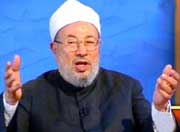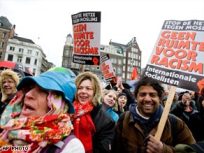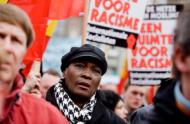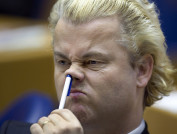“So what did I think of the Geert Wilders film Fitna? I thought it was very effective, and very shocking, in showing that the inspiration for the evil acts of which it showed such horrifying glimpses lay in the Koran. It shows very clearly the precise nature of what the civilised world is up against, a war of religion with striking similarities to Nazi ideology and murderous mass hysteria.”
Category Archives: Netherlands
Dutch film an extremist ‘plot to widen Islam-West gulf’
 The Doha-based Muslim scholar Sheikh Yousuf al-Qaradawi has condemned the anti-Islam film released last Thursday by a far-right Dutch lawmaker.
The Doha-based Muslim scholar Sheikh Yousuf al-Qaradawi has condemned the anti-Islam film released last Thursday by a far-right Dutch lawmaker.
He said the release was part of “a scheme to commit offences against Islam by extremists in the West. They continue to instigate hatred and widen the gulf between Islam and the West. Our problem is mainly with the extremist segment in the West which spares no chance to attack Islam and provoke Muslims into battles. It seems they seek gains of some type by raising fears about Islam. We were trying to forget the offending cartoons published by the Danish newspapers. We wanted to turn a new page with the West. But they reprinted them again. Muslims do not seek clashes or conflict,” Qaradawi told the IslamOnline.net website.
Qaradawi, who is also the head of the International Union for Muslim Scholars (IUMS), told the website that Muslims should not tolerate frequent offences against Islam. “Muslims should demand that their governments implement a united and clear stance on such attacks. They should also boycott products of countries which accept such attacks by their citizens,” he was quoted as saying.
However, Qaradawi appreciated the Dutch government for its stance on the movie saying that the response of the government was “positive”. “I thank the government of Netherlands for condemning the movie,” he said.
He also slammed the practices of Muslim extremists which, he said, distorted Islam’s image. “Unfortunately, there are many Muslims who give the enemies of Islam the pretext to attack it. They give Islam a bad image because of their misinterpretation of the Holy Qur’an,” he was quoted as saying.
About the content of the movie, he refuted its content as “baseless claims” saying that Qur’an in many of its verses calls for human brotherhood regardless of religion or ethnicity. “When wine was prohibited by Qur’an, the main reason for prohibition was that drinking can instigate hatred and cause troubles between people,” he said.
On the so-called verses on Jihad which, the movie presented as an example of blood thirsty Islam, he said Islam does not tolerate killing. “Jihad in Islam was only to defend religion, home, honour and sanctities,” he was quoted as saying.
Muslims rebut Wilders’ film
Muslim scholars have refuted allegations in anti-Qur’an documentary by Dutch far-right lawmaker Geert Wilders that the Noble Book is inciting violence against non-Muslims.
Wilders releases anti-Islam film
 The anti-Islam Dutch politician Geert Wilders on Thursday released on the Internet his highly charged and much-anticipated anti-Koran film, which matches graphic images of terrorist attacks and death threats against Jews by Muslim extremists with verses of the Muslim holy book.
The anti-Islam Dutch politician Geert Wilders on Thursday released on the Internet his highly charged and much-anticipated anti-Koran film, which matches graphic images of terrorist attacks and death threats against Jews by Muslim extremists with verses of the Muslim holy book.
The 15-minute film – titled “Fitna”, Arabic for civil strife – features news images of beheadings, violence against women in the Islamic world, anti-Semitic tirades by imams and the aftermath of terrorist attacks in New York and Madrid, including the charred remains of some victims. Those film clips of violence are alternated with images of verses of the Koran, which Mr. Wilders claims inspires such acts.
Mr. Wilders, a member of the Dutch Parliament and the leader of an anti-Islam political party, said his intention with the film was to warn the West about a religion he viewed as dangerous and intolerant and to stop what he called the Islamization of the Netherlands and other Western societies.
Prime Minister Jan Peter Balkenende of the Netherlands renounced Mr. Wilders’s film and his vision with a statement he read at a news conference after the film was released. “The film equates Islam with violence: we reject that interpretation,” he said at the news conference in The Hague. “We believe it serves no purpose other than to offend.”
Mr. Wilders told reporters after his film’s release that “Islam and the Koran are dangers to the preservation of freedom in the Netherlands in the long term, and I have to warn people of that.”
See also CNN, 28 March 2008
For Ali Eteraz’s response, see “The Fitna farce”, Guardian, 29 March 2008
Dutch protest against Islam film
 At least 1,000 people have taken part in a demonstration in Amsterdam against the planned release of a film expected to be highly critical of Islam.
At least 1,000 people have taken part in a demonstration in Amsterdam against the planned release of a film expected to be highly critical of Islam.
Protesters objected to the planned internet release of the film by Dutch right-wing politician Geert Wilders. Mr Wilders says the 15-minute film deals with Islamic ideology which he describes as “the enemy of freedom”.
Some protesters in central Amsterdam carried signs that said “Stop the witch hunt against Muslims”.
“We can no longer remain silent. There is a climate of hate and fear in the Netherlands,” said Rene Danen, a spokesman from anti-racism organisation Nederland Bekent Kleur (The Netherlands Shows its Colours), which organised the protest.
See also Canadian Press, 22 March 2008
And “Web host suspends site planned for anti-Koran film”, Reuters, 22 March 2008
In the UK the fascists rally to the defence of their co-thinker Wilders: BNP news article, 23 March 2008
Wilders’ anti-Islam akin to anti-semitism
Entertainment entrepreneur Harry de Winter has taken out a page-wide advert on the front page of Monday’s Volkskrant newspaper accusing MP Geert Wilders of racism.
“If Wilders said the same about Jews and the Old Testament as he does about Muslims (and the Koran) he would have been long picked up and sentenced for anti-semitism,” the advert reads. The advert is signed by the foundation “Another Jewish voice”, which De Winter helped found.
In an interview with the paper, De Winter says that Wilders’ approach to Islam is like the build-up of anti-Jewish sentiment before World War II. “I see no difference between a skull-cap (worn by Jewish men) and a headscarf,” De Winter said. “I hope we get support from across the Jewish community because they should recognise this like no-one else.”
For Wilders’ recent speech to the Dutch parliament (“The Koran is above all a book of war – a call to butcher non-Muslims”), see PVV website.
Ramadan wants Muslims to ignore far-right Dutch film on Koran
As the premiere of the long-awaited Koran film by far-right Dutch politician Geert Wilders nears, it’s not uncommon to hear Muslims call for some way to censor what they expect to be a blistering condemnation of their faith. But not all see the film – now expected to be broadcast by the end of this month – as an opportunity to revive the polarisation of the Prophet Mohammad cartoons clash in 2006, when freedom of expression and respect for faith were presented as implacable opposites.
Tariq Ramadan, one of Europe’s most prominent Muslim intellectuals, has never shied from confronting the critics of his faith. But his approach to the Wilders film aims to avoid a repeat of the cartoons controversy. At a recent conference in Sweden, he told Reuters that people could not be prevented from publishing material like the Wilders film and the Danish newspaper cartoons of the Prophet Mohammad that triggered protests across the Muslim world. Ramadan went on: “My advice (to Muslims) is take an intellectual critical distance towards this. Say ‘we don’t like it’ but go ahead and just ignore it.”
‘I don’t hate Muslims. I hate Islam,’ says Wilders
 A TV addict with bleached hair who adores Maggie Thatcher and prefers kebabs to hamburgers, Geert Wilders has got nothing against Muslims. He just hates Islam. Or so he says. “Islam is not a religion, it’s an ideology,” says Wilders, a lanky Roman Catholic right-winger, “the ideology of a retarded culture.”
A TV addict with bleached hair who adores Maggie Thatcher and prefers kebabs to hamburgers, Geert Wilders has got nothing against Muslims. He just hates Islam. Or so he says. “Islam is not a religion, it’s an ideology,” says Wilders, a lanky Roman Catholic right-winger, “the ideology of a retarded culture.”
Wilders has been immersing himself in the suras and verse of seventh-century Arabia. The outcome of his scholarship, a short film, has Holland in a panic. He is just putting the finishing touches to the 10-minute film, he says, and talking to four TV channels about screening it.
“It’s like a walk through the Koran,” he explains in a sterile conference room in the Dutch parliament in The Hague, security chaps hovering outside. “My intention is to show the real face of Islam. I see it as a threat. I’m trying to use images to show that what’s written in the Koran is giving incentives to people all over the world. On a daily basis Moroccan youths are beating up homosexuals on the streets of Amsterdam.”
Wilders echoes some of the arguments against multiculturalism that have convulsed Germany in recent years. Like many on the traditional German right, he wants the European Judaeo-Christian tradition to be formally recognised as the dominating culture, or Leitkultur. “There is no equality between our culture and the retarded Islamic culture. Look at their views on homosexuality or women,” he says.
“Islam is something we can’t afford any more in the Netherlands. I want the fascist Koran banned. We need to stop the Islamisation of the Netherlands. That means no more mosques, no more Islamic schools, no more imams… Not all Muslims are terrorists, but almost all terrorists are Muslims.”
Dutch MPs call for Islamophobia debate
MPs from the left-wing green party GroenLinks on Tuesday called for an emergency debate with integration minister Ella Vogelaar after an EU watchdog said Muslim minorities in the Netherlands are facing increasing violence and intolerance.
The new report from the European Commission against Racism and Intolerance said Islamophobia in the Netherlands has “increased dramatically” since 2000. “The criminal justice system, and notably the police, still needs to enhance its role in monitoring and countering racially-motivated offences,” the report said.
The tone of Dutch political and public debate around integration and other issues relevant to ethnic minorities has experienced “dramatic deterioration,” the report say and goes on to warn of a “worrying polarisation between majority and minority communities”. It criticises the official approach to integration for focusing too much on the “perceived deficiencies” among the minority population.
The Netherlands Muslims – around 6% of the population – face “stereotyping, stigmatising, outright racist political discourse and biased media portrayal,” the report continues. Anti-semitism is also on the rise.
The report calls on the Dutch authorities to take the lead in promoting a public debate on integration that avoids “polarisation, antagonism, and hostility”. It calls on ministers to take steps to counter the use of “racist and xenophobic discourse in politics” and review a number of policies which it says result in direct and indirect racial discrimination.
In particular, the report singles out anti-immigration MP Geert Wilder’s PVV party which it says has been “particularly vocal in proposing controversial policies and in resorting to racist or xenophobic discourse, targeting above all Muslim communities”. However, the report notes: “members of mainstream political parties rarely take a stand against this type of discourse.”
Read the ECRI report here.
Islamophobia ‘on rise in Netherlands’
The Muslim minority are facing violence and discrimination due to the new wave of Islamophobia in the Netherlands, an anti-racism group says. The findings were released in a report by a pan-European anti-racism commission, AFP reported.
The European Commission against Racism and Intolerance (ECRI) found that Islamophobia in the Netherlands had ‘increased dramatically’ since 2000. It also reported that Muslims were ‘disproportionately targeted’ by security policies and faced racist violence and discrimination.
The report went on to add that this was fuelled by events both occurring within the country and outside, such as the 9/11 attacks on the US. “The tone of Dutch political and public debate around integration and other issues relevant to ethnic minorities has experienced a dramatic deterioration”. It warned of a “worrying polarization between majority and minority communities.”
The country’s Muslim community of around one million – six percent of the population – had also faced “stereotyping, stigmatizing”, “outright racist political discourse” and “biased media portrayal”.
See also Associated Press, 12 February 2008
